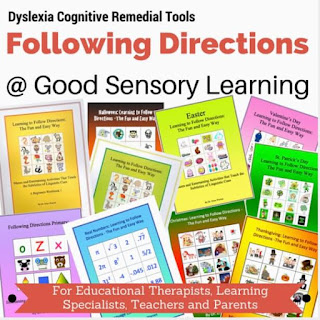This week I wanted to tell you about my online store, Good Sensory Learning. I’m Dr. Erica Warren, and I established this site so I could share all the materials that I have created over the last 20+ years as a learning specialist and educational therapist. When I first began my private practice, Learning to Learn, I had great difficulty finding fun and multisensory materials for my students that were effective and engaging. So back in 2005, I made it my mission to design and distribute high-end, remedial products as well as memorable, motivating lessons that bring delight to learning. If you would like to try a free sampling of my activities , CLICK HERE . How Are the Products Organized at Good Sensory Learning? You can download my Free Printable Catalog or you can browse the site using the grey “search all products” bar in the top right of any page with keywords such as dyslexia, working memory, and executive functioning. What’s more, drop down menus in the red banner allow you t...
It is easy for parents and even teachers to lose their cool when children do not listen to repeated directions. So, if kids aren’t making sense of what they hear, how can the learning process even take place? To solve this problem, it is necessary to uncover the root causes of poor listening skills. Then, one must find the individualized, cognitive-based culprits for each student.
There are a number of core cognitive skills that support one's capacity to listen:
Cheers, Erica
Dr. Erica Warren is the author, illustrator, and publisher of multisensory educational materials at Good Sensory Learning and Dyslexia Materials. She is also the director of Learning to Learn and Learning Specialist Courses.
· Blog: https://learningspecialistmaterials.blogspot.com/
· YouTube Channel: https://www.youtube.com/user/warrenerica1
· Podcast: https://godyslexia.com/
· Store: http://www.Goodsensorylearning.com/ & www.dyslexiamaterials.com
· Courses: http://www.learningspecialistcourses.com/
· Newsletter Sign-up: https://app.convertkit.com/landing_pages/69400
There are a number of core cognitive skills that support one's capacity to listen:
- Attention - Attention is the ability to tune into information, sensations, and perceptions that are relevant in the moment.
- Working memory - Working memory is a cognitive function that enables students to recall and use relevant information to complete an activity. It also enables learners to hold multiple pieces of information in the mind and manipulate them. Often described as a mental workspace, working memory helps students stay focused, block distractions and stay abreast of their surroundings. If you are looking for ways to improve working memory CLICK HERE
- Receptive language - Receptive language is your brain’s ability to receive verbal and nonverbal information presented in the environment. It can involve organizing thoughts, following a sequence of directives, or even maintaining attention. To learn more about solutions to both receptive and expressive language problems CLICK HERE.

- Auditory processing - Auditory processing is the brain's interpretation of the sounds we hear. A weakness in auditory processing is not an issue with hearing, but with the understanding of what is heard. It's a complex skill that involves auditory synthesis, auditory closure, auditory sequencing, auditory discrimination, segmenting and auditory memory. To learn more about understanding and remediating auditory processing CLICK HERE.
- Nonverbal listening skills - Nonverbal listening skills are the visual cues or behaviors that one exhibits when paying attention. It is these cues or behaviors that communicate to the surrounding people that one is engaged and present. This includes eye contact as well as body language. For example, a disengaged child may slump in his chair and look out the window, while an engaged child gives direct eye contact, nods their head and leans forward over the desk.
- Visualization - Visualization is an internal process, and developing children's’ ability to visualize can provide them with a secret weapon that can enhance learning capacity, improve memory and spark creativity. In fact, the research shows that visualization improves reading comprehension, creative writing abilities and the encoding and retrieval of math, history and science concepts. To learn more about how visualization can improve attention and memory CLICK HERE
- Metacognition - Metacognition is the self-regulation of one's own thinking, and it is often described as "thinking about thinking.” One uses higher order reasoning, visualization, and one's inner voice to actively control the thought processes and maintain engagement in learning. If you want to learn more about metacognition and mindful strategies for students CLICK HERE
 Individualizing the Remedial Approach
Individualizing the Remedial Approach
Now that you know the seven possible causes of poor listening skills, it will be important to consider each of these factors for each student. Once you have defined the root causes for each student, the best possible remedial approaches can be adopted. Tune in to next week’s blog when we will review fun games and activities that strengthen listening skills.
Cheers, Erica
Dr. Erica Warren is the author, illustrator, and publisher of multisensory educational materials at Good Sensory Learning and Dyslexia Materials. She is also the director of Learning to Learn and Learning Specialist Courses.
· Blog: https://learningspecialistmaterials.blogspot.com/
· YouTube Channel: https://www.youtube.com/user/warrenerica1
· Podcast: https://godyslexia.com/
· Store: http://www.Goodsensorylearning.com/ & www.dyslexiamaterials.com
· Courses: http://www.learningspecialistcourses.com/
· Newsletter Sign-up: https://app.convertkit.com/landing_pages/69400

Comments
Post a Comment